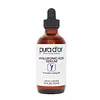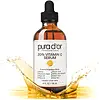What's inside
What's inside
 Key Ingredients
Key Ingredients

 Benefits
Benefits

 Concerns
Concerns

No concerns
 Ingredients Side-by-side
Ingredients Side-by-side

Aloe Barbadensis Leaf Juice
Skin ConditioningAscorbic Acid
AntioxidantPropanediol
SolventHamamelis Virginiana Bark/Twig Extract
AstringentTremella Fuciformis Sporocarp Extract
AntioxidantBetaine
HumectantGlycerin
HumectantHyaluronic Acid
HumectantFerulic Acid
AntimicrobialDimethyl Sulfone
SolventTocopherol
AntioxidantArgania Spinosa Kernel Oil
EmollientRetinol
Skin ConditioningSimmondsia Chinensis Seed Oil
EmollientPhytic Acid
Sodium Citrate
BufferingSodium Metabisulfite
AntioxidantXanthan Gum
EmulsifyingCaprylyl Glycol
EmollientCaprylhydroxamic Acid
Aloe Barbadensis Leaf Juice, Ascorbic Acid, Propanediol, Hamamelis Virginiana Bark/Twig Extract, Tremella Fuciformis Sporocarp Extract, Betaine, Glycerin, Hyaluronic Acid, Ferulic Acid, Dimethyl Sulfone, Tocopherol, Argania Spinosa Kernel Oil, Retinol, Simmondsia Chinensis Seed Oil, Phytic Acid, Sodium Citrate, Sodium Metabisulfite, Xanthan Gum, Caprylyl Glycol, Caprylhydroxamic Acid
 Reviews
Reviews

Ingredients Explained
These ingredients are found in both products.
Ingredients higher up in an ingredient list are typically present in a larger amount.
Hyaluronic acid is naturally found in healthy skin. It is a humectant, meaning it draws moisture to your skin.
This ingredient helps hydrate, soothe, and protect the skin.
What makes hyaluronic acid so hydrating? It has the capacity to bind or hold large amounts of water.
Fun fact: It is already naturally found in our bodies, such as the fluids of our eyes and our joints.
Studies find this ingredient to have anti-inflammatory and anti-microbial properties. This can help speed up wound-healing.
Hyaluronic acid can be irritating if the molecule has a low-molecular weight, or if the molecules are small.
One study found low-molecular weight hyaluronic acid to be pro-inflammatory, meaning some people may experience irritation. This is because our bodies use hyaluronic acid in the wound-healing process to signal to our bodies, via irritation, that something needs healing.
The same study found high-molecular weight hyaluronic acid to be anti-inflammatory.
These are some other common types of Hyaluronic Acid:
Learn more about Hyaluronic Acid